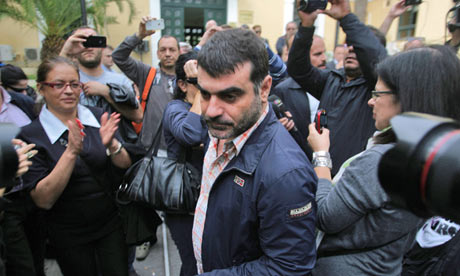By Madeline Schiesser
Impunity Watch Reporter, Europe
ATHENS, Greece – Last Sunday, a Greek independent magazine editor, Kostas Vaxevanis, was arrested on the charge of breach of privacy for publishing the names of 2,059 Greeks alleged to have Swiss bank accounts. Only days later on Thursday, Vaxevanis was tried, and was acquitted. However, Vaxevanis claims that his arrest, trial, and subsequent release, and the lack of press coverage thereof in Greece as opposed to in foreign countries, demonstrates that the business elite in Greece have muzzled the Greek press.

Last Saturday (10/27), Vaxevanis’ Hot Doc magazine published a list he claims is the infamous Lagarde list, containing the names of 2,059 Greeks believed to have accounts in the Geneva branch of HSBC, according to the New York Times. Vaxevanis claimed he got it from an anonymous source, according to Returns.
The following morning (10/28), police surrounded the home of Vaxevanis’ friend with whom he was staying while Vaxevanis was giving a live radio interview. According to the New York Times, Vaxevanis tweeted: “They’re entering my house with the prosecutor right now. They are arresting me. Spread the word.”
The prosecutor charged Vaxevanis with breach of privacy at setting his trial date for Monday before releasing him several house later. The alleged crime carries a prison term of up to two years and a fine of about 30,000€ ($39,000).
A police officer explained to Returns that “the prosecutor issued a warrant for Vaxevanis’ arrest because he published a list of names without special permission and violated the law on personal data. There is no proof that the persons or companies included in that list have violated the law . . . . on tax evasion or money laundering.”
However, Vaxevanis felt that he had a duty to the Greek people to report the truth. During a recess in his trial, he told the Guardian: “If you look at the names, or the offshore companies linked to certain individuals, you see that these are all friends of those in power. Phony lists had also begun to circulate. It was time for the truth.”
On Monday (10/29), Vaxevanis’ trial date was set for Thursday, November 1. The New York Times noted that many Greeks saw the speed with which the trial moved ahead “as a sharp contrast to the normally slow wheels of Greek justice,” particularly in light of the Greek state’s resilience to investigate those named on the Lagarde List.
A few days later, Vaxevanis noted, “I don’t think the decision to bring me before the court was the work of an overzealous prosecutor. I think it was very deliberate and very vindictive.”
On Thursday (11/1), Vaxevanis was acquitted by a three judge panel in a hearing that lasted almost 12 hours. His lawyers argued in part that the charges were outrageous and that no one on the list had complained of a breach of privacy.
The Lagarde List, so named after former French Finance Minister Christine Lagarde who gave the list to her Greek counterpart, George Papaconstantinou, in 2010, had been believed to contain the names of prominent Greeks who used Swiss bank accounts to avoid paying taxes.
However, in the two years since obtaining the list, the Greek government did not appear to take action to investigate those named, and there have been accusations of a cover up. Greek finance ministers have claimed both to have lost the list, and to have turned it over to the appropriate police authorities.
The list Vaxevanis published includes a former culture minister, doctors, lawyers and individuals identified as “housewives,” but did not include information on the amount of money anyone had in an account. Even so, the Lagarde List of wealthy, allegedly tax evading Greeks is especially jarring in a nation attempting to pull itself out of financial crisis and suffering from tax increases and wage cuts.
Since his acquittal, Vaxevanis has further claimed that Greece is essentially controlled by a group or corrupt politicians working with businessmen who own and muzzle the press. He cites for example the lack of coverage of his own trial, and especially acquittal, by the Greek media.
“Had it not been for the foreign media taking such an interest in my own story, it would have been buried. With few exceptions, hardly any of the Greek media bothered to report that I was acquitted, when CNN and the BBC were breaking into their news broadcasts to do so,” Vaxevanis said.
“The country is governed by a poisonous combination of politicians, businessmen and journalists who cover one another’s backs. Every day laws are changed, or new laws are voted in, to legitimize illegal deeds.” However, Vaxevanis intends to continue his fight against political corruption and scandal in Greece: “The political elite have got used to the mainstream press not annoying them, but investigation is what we do.”
For further information, please see:
BBC News – Greek Bank Leak Editor Costas Vaxevanis Acquitted – 2 November 2012
The Guardian – Greece is Governed by a Corrupt Clique, Says Kostas Vaxevanis – 2 November 2012
The Guardian – Greek Editor Kostas Vaxevanis Acquitted Over Swiss Bank List – 1 November 2012
The New York Times – Greece Moves Quickly to Put Editor on Trial – 29 October 2012
BBC News – Greece Arrests Journalist Over ‘Lagarde List’ Banks Leak – 28 October 2012
GlobalPost – Greek Journalist Kostas Vaxevanis Arrested for Releasing ‘Lagarde List’ of Swiss Account Holders – 28 October 2012
The Guardian – Greek Magazine Editor in Court for Naming Alleged Tax Evaders – 28 October 2012


